Key takeaways:
- Successful networking focuses on building genuine relationships through active listening and sharing personal experiences.
- Trust and authenticity are essential for fostering deeper connections and collaboration.
- Following up after networking events enhances relationships and encourages continued engagement.
- Vulnerability can create powerful bonds, turning casual interactions into meaningful exchanges.
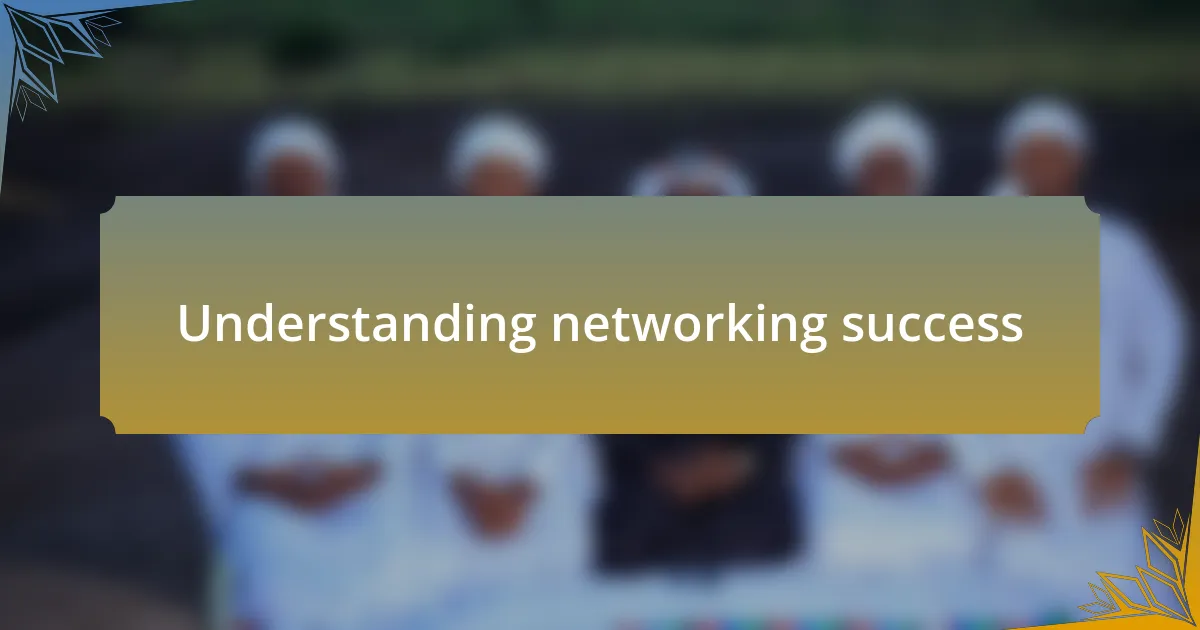
Understanding networking success
Successful networking is all about building genuine relationships rather than merely exchanging business cards. I remember attending a conference where a casual conversation over coffee turned into a lasting partnership. This experience taught me that when you approach networking with the intent to connect on a personal level, opportunities often follow.
Another crucial aspect of networking success is active listening. I’ve found that showing genuine interest in others—not just waiting for my turn to speak—creates a much deeper connection. Have you ever left a conversation thinking, “Wow, they really heard me”? Those moments are priceless and lay the foundation for meaningful collaborations.
Trust plays a vital role in networking as well. From my experience, people tend to open up when they feel they can trust you. This trust often leads to shared experiences and future opportunities. How do you establish trust? I believe it begins with being authentic and sharing your own journey, encouraging others to do the same. This creates a supportive environment where networking can truly flourish.
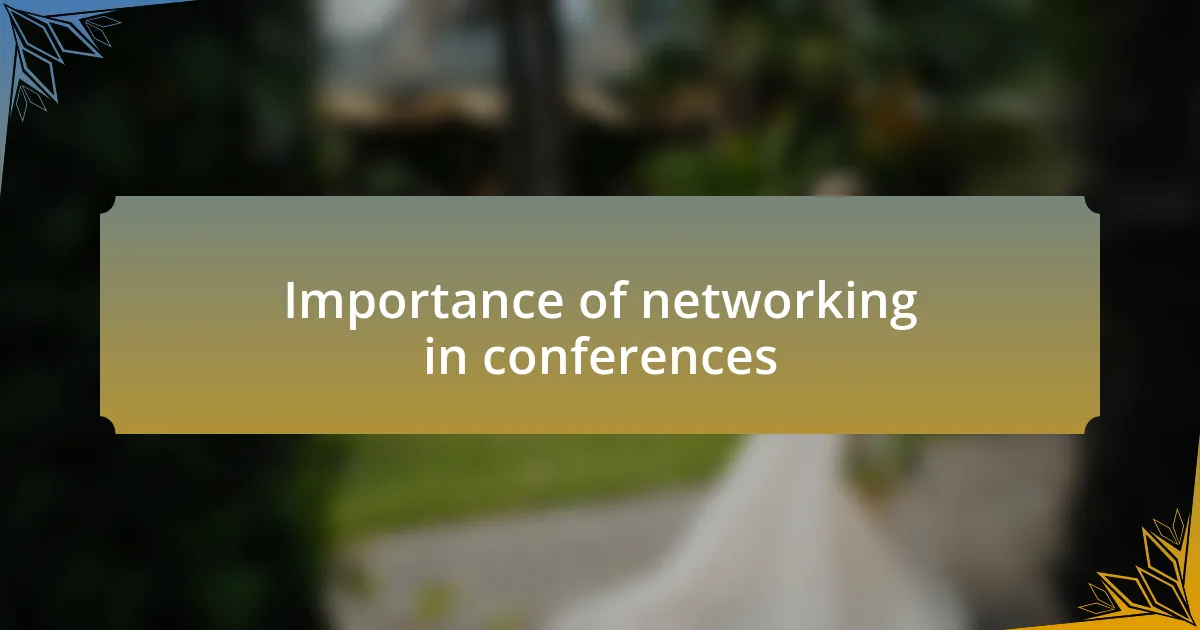
Importance of networking in conferences
Successful networking at conferences plays a critical role in fostering connections that can enrich our professional lives. For instance, I once attended a session where I met someone with similar interests. That initial conversation led to a brainstorming session that transformed into a collaborative project. It’s fascinating how a single interaction can open doors to endless possibilities.
Moreover, networking isn’t just about making contacts; it’s about creating a community. I remember feeling overwhelmed at my first conference, but after engaging sincerely with fellow attendees, I discovered that we all shared similar challenges and dreams. Isn’t it remarkable how that sense of belonging can ignite inspiration and drive?
Ultimately, the importance of networking in conferences lies in the relationships we cultivate. When I think back on meaningful connections I’ve made, they often stemmed from moments of vulnerability and openness. Have you ever shared a personal story that resonated with someone else? That shared experience often leads to a deeper understanding and even newfound friendships.

Key elements of effective networking
Building on the foundation of trust is crucial in effective networking. I recall a time when I took the initiative to ask someone for advice during a breakout session at a conference. Our conversation quickly shifted from professional insights to personal values, creating a genuine connection. Isn’t it interesting how vulnerability can make the toughest connections feel effortless?
Engagement also plays a significant role in successful networking. During a recent conference, while participating in an interactive workshop, I noticed how music can bring people together. We were tasked with sharing our favorite songs, and suddenly, laughter and stories flowed freely. Have you ever realized how a simple icebreaker can lay the groundwork for meaningful discussions?
Additionally, follow-ups are an often-overlooked element of networking. After exchanging contacts with a few attendees, I made it a point to reach out within a week. This small gesture turned into fruitful conversations about our projects. How often do we forget to nurture those connections once the event is over? Making an intentional effort can keep the momentum going and transform those initial meetings into lasting relationships.

Building genuine connections
Building genuine connections goes beyond surface-level interactions; it’s about exploring shared experiences and emotions. I recall a moment during a networking event when I opened up about my challenges in the industry. The person I was speaking with responded with a similar story of their own struggles. Have you ever found that sharing fears can turn strangers into allies? It’s in those moments of authenticity that true bonds are formed.
Listening actively is another essential component of fostering genuine relationships. I remember meeting someone who spoke passionately about their project, and rather than just waiting for my turn to speak, I made sure to truly listen. This led to a deep discussion where we exchanged ideas, and much to my surprise, my perspective shifted entirely. Engaging in such a way not only builds rapport but shows that you value the other person’s thoughts. Don’t you think that genuine interest can leave a lasting impression?
Finding common passions can also bridge the gap between acquaintances and friends. During a conference, I met an attendee who shared my love for environmental sustainability. Our shared enthusiasm sparked a vibrant conversation that extended well beyond the event’s schedule. Do you remember the last time a shared passion ignited a memorable connection for you? I believe that recognizing and nurturing those shared interests can transform fleeting encounters into meaningful relationships that endure long after the conference ends.
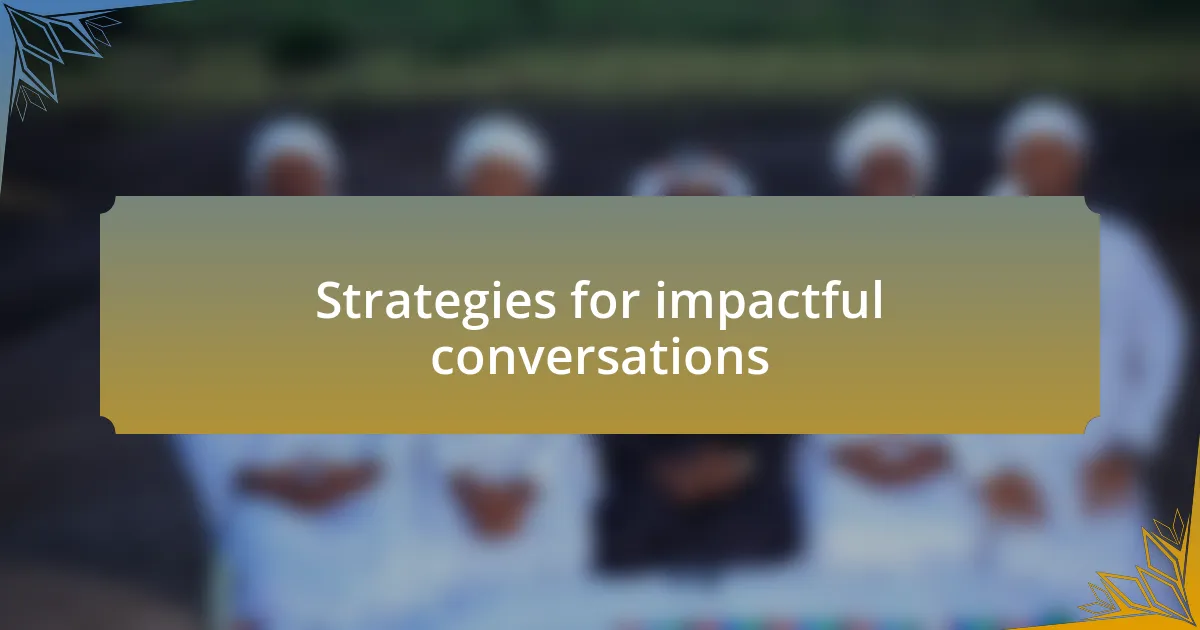
Strategies for impactful conversations
Effective conversations often hinge on asking open-ended questions. I once attended a networking session where I simply asked someone about their favorite project. The floodgates opened, and I learned so much more than I expected—inspiration bubbled to the surface. Have you ever noticed how a well-crafted question can lead to unexpected insights? It’s a powerful way to engage others and deepen discussions.
Another strategy involves mirroring body language to foster connection. At a workshop, I found myself subconsciously mimicking the gestures of the person I was speaking with. It created an unspoken bond that made our conversation feel more natural and fluid. Don’t you think that when we align physically, it sends a signal that we’re truly in sync? This non-verbal communication can significantly enhance the impact of what we say.
Additionally, sharing something personal can set the stage for impactful dialogue. I recall meeting a fellow attendee and revealing a minor setback I faced. Their genuine empathy opened up a space for vulnerability that led us both to share deeper insights about our journeys. What’s your experience with sharing personal stories? I believe it creates a sense of trust that allows conversations to flourish and connections to deepen.
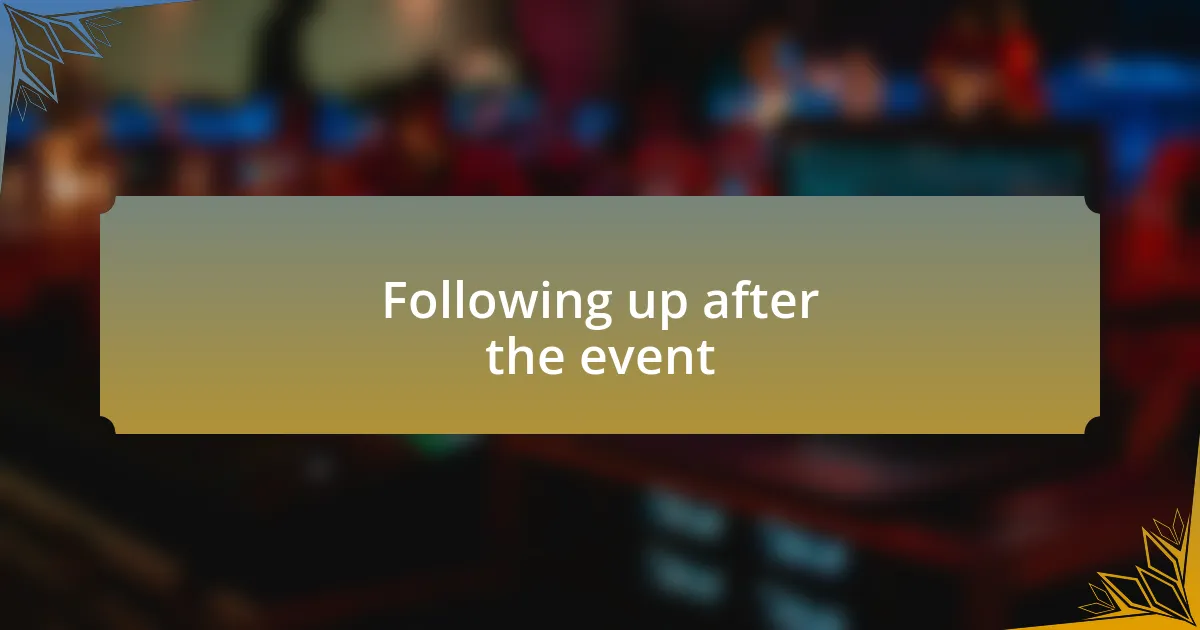
Following up after the event
Following up after a networking event can make all the difference in nurturing the relationships you’ve built. A few days after a recent conference, I took time to send personalized emails to a handful of people I connected with. In my message, I referenced something we discussed, which created a reminder for them. Have you ever noticed how a small touchpoint can reignite a conversation? It can transform a fleeting encounter into a meaningful relationship.
I’ve also found that social media is an invaluable tool for follow-ups. After another event, I made it a point to connect with a few attendees on LinkedIn. I commented on their posts and shared relevant articles related to our discussions. This not only keeps the conversation alive but shows that I’m genuinely interested in their work. Isn’t it gratifying to know that a simple online acknowledgment can lead to further engagement?
Lastly, I believe that attending follow-up events or catch-up coffee chats can solidify connections built during the conference. I once invited a contact for a casual coffee after meeting at a customer experience event to delve deeper into shared interests. The conversation flowed seamlessly, and we ended up collaborating on a project. Have you considered how a face-to-face meeting can deepen your connections? It often leads to opportunities that wouldn’t have surfaced otherwise.
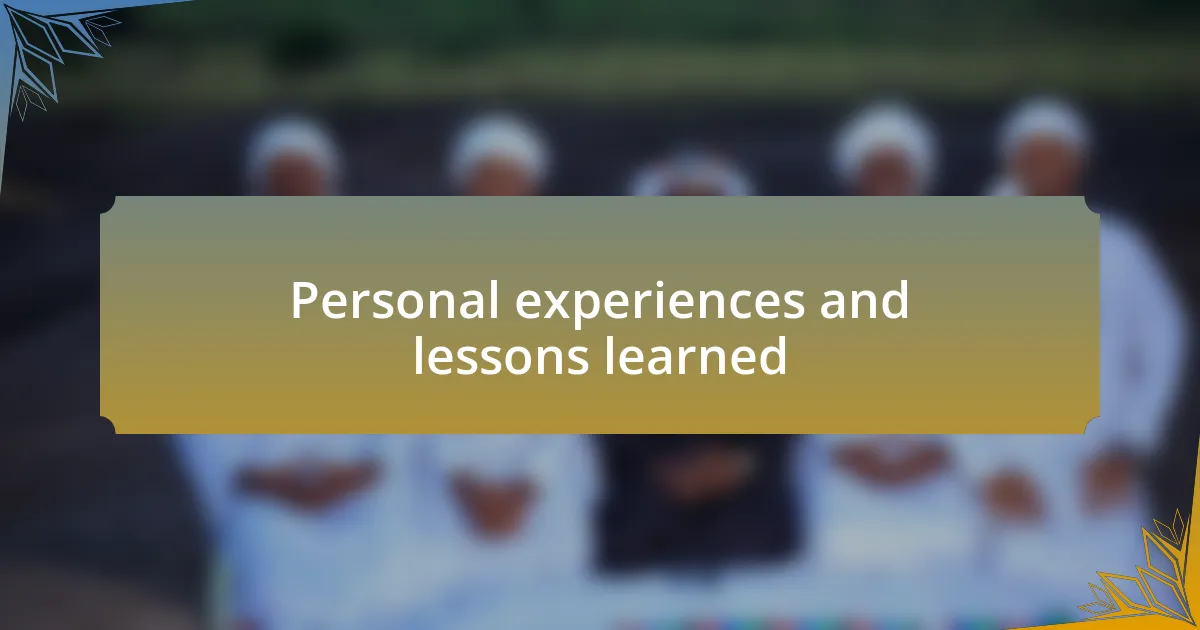
Personal experiences and lessons learned
Networking has taught me to embrace vulnerability. At a recent conference, I shared a personal challenge I was facing with my business during a discussion. The response was overwhelming—others opened up about their struggles too. It created an instant bond and transformed that moment from casual small talk to a supportive exchange. Have you ever felt the power of vulnerability in building trust?
One lesson that stands out in my mind is the importance of active listening. During a past event, I was focused on sharing my insights instead of truly hearing my conversation partners. It wasn’t until I made a conscious effort to listen that I uncovered valuable information that could guide my projects. The moment I shifted my approach, relationships blossomed. Isn’t it fascinating how slowing down to listen can unlock so much potential?
Trust is another critical element I’ve learned while networking. I remember a meaningful conversation with a fellow attendee where we discussed our mutual interests and experiences. By being honest about what I seek in connections, I found that the other person responded with openness. We established a foundation of trust that led to collaborative opportunities down the line. Have you experienced how authenticity can pave the way for more rewarding relationships?